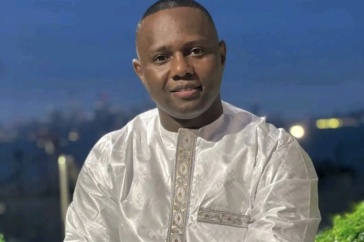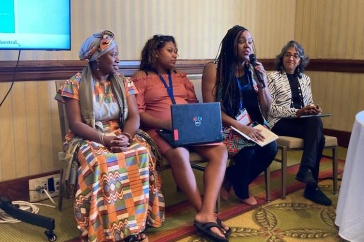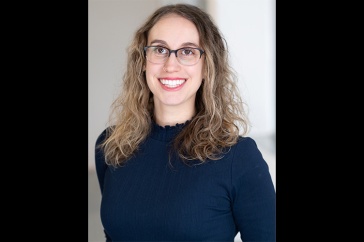
“I want to reframe everyone’s mindset that nursing and human security can’t go together, because they can and should. I think there’s this very strong, preconceived notion that nurses are at the bedside and we’re just clinicians,” says Kristy Miyashita, a current master’s student pursuing a Global Conflict and Human Security degree from the Carsey School of Public Policy. “I want to reframe that mindset.”
In Kristy’s application letter to the DACOR Bacon House Foundation Education Committee, she touched on the problems she ran into throughout her education journey and the “conventional trajectory” she felt was imposed upon her:
“The problem I had with nursing school is that it directed us onto a one-way track leading straight into the hospital career path. The conventional trajectory expected us to obtain our licenses and dive into bedside work without much room for considering alternative paths. It was during a flight in the summer of 2018 that I glanced out the window and had a cliché but significant realization: ‘The world is SO big.’ What a shame it would be to remain complacent, working inside the four walls of a hospital before truly experiencing it.”
For many, the fields of nursing, global conflict, and human security might seem unrelated; for Kristy Miyashita, however, the two couldn’t go together better. Kristy was recently chosen for a DACOR Bacon House Foundation Fellowship, which awards up to $10,000 to chosen individuals who are pursuing advanced studies in foreign affairs. When asked about being chosen, she talks about reframing the ‘nurse mindset’: “Getting chosen for this fellowship…I almost had imposter syndrome. I was like, ‘Really? Me? I’m just a nurse!’. But I think that the ‘I’m just a nurse’ mindset could be used to an advantage because I have a very unique background. With nursing, you have to have incredible critical thinking and empathy skills, and those are transferable to the health security field that I do want to get into.”
How did Kristy become interested in health security, especially within communities abroad? Two words: Peace Corps.
After graduating with her bachelor’s degree in nursing from the University of Rhode Island in 2018, Kristy didn’t wait to put her skills to use; instead, she opted to join the Peace Corps as a Community Health Volunteer in Paraguay. “I don’t think I would have had the same drive to act on my passion for health advocacy and equity abroad—as opposed to the marginalized communities within the U.S.—had I not joined the Peace Corps,” she says. “It pushed me out of my comfort zone completely. I got to see first-hand the importance of organic connection and how community engagement can really affect the success of projects.”
While in Paraguay, Kristy worked with a community of about 5,000 people located in the rural countryside. There, she was able to work in the school, teaching classes about noncommunicable disease prevention, hydration, prenatal health, and even Zumba. Her favorite project was working with kids to talk about their strengths, weaknesses, and interests and to then brainstorm career paths they might enjoy based on their preferences. “They would answer a set of questions and I would piece together what the kids’ preferences may lead them to be in the future. I was able to open up their eyes to so many more options.”
After her two years with the Peace Corps, Kristy realized that she didn’t fit into society’s expectations of what nurses should be—instead, she longed to help those overseas. When she started to browse the higher education options available to her through the Peace Corps Coverdell Fellowship, she came across the opportunity to enroll in the Global Conflict and Human Security master’s program at the Carsey School (GCHS). “I went online to look at the Peace Corps Coverdell partners, and I would say 99% of the programs just seemed so similar with international studies. The GCHS program, though, was so specifically geared towards the seven issues relating to human welfare that fall under the United Nation’s Human Security framework, with one of those being health security.” With the help of Professor Negron-Gonzales and a doctor who is a part of Doctors Without Borders—a nonprofit dedicated to providing aid around the globe—Kristy was able to get a personalized list of classes that helped intertwine her nursing lens and interest in the program. “I think that this program has such a unique take on the field,” she says. “I was really drawn to that.”
 At the moment, Kristy works in the oncology field at a New York hospital, but she is also pursuing other projects in her education journey. For her capstone class, she has had the opportunity to aid the Latino asylum-seeking refugee population in Manhattan and Queens by helping individuals find and access healthcare. “A lot of the barriers from seeking medical attention come from the language, cultural, and systemic health inequity aspects. To address these barriers, I’m formulating a more accessible place for them to get information about proactive healthcare, accessing healthcare materials in Spanish, and providing knowledge of resources to mitigate disparities in their health outcomes,” Kristy says. The Roosevelt Hotel, which is being used as a migration intake center, is the place where she conducts interviews, group discussions, and individual health assessments that provide information of what diseases an individual may be susceptible to; and mind you, Kristy is going at this project alone.
At the moment, Kristy works in the oncology field at a New York hospital, but she is also pursuing other projects in her education journey. For her capstone class, she has had the opportunity to aid the Latino asylum-seeking refugee population in Manhattan and Queens by helping individuals find and access healthcare. “A lot of the barriers from seeking medical attention come from the language, cultural, and systemic health inequity aspects. To address these barriers, I’m formulating a more accessible place for them to get information about proactive healthcare, accessing healthcare materials in Spanish, and providing knowledge of resources to mitigate disparities in their health outcomes,” Kristy says. The Roosevelt Hotel, which is being used as a migration intake center, is the place where she conducts interviews, group discussions, and individual health assessments that provide information of what diseases an individual may be susceptible to; and mind you, Kristy is going at this project alone.
In the post-grad future, Kristy aims to either help those abroad or refugees within the United States, a population that she has a passion to help. She aims to replicate projects that she accomplished during her time in the Peace Corps, an experience that has been quite impactful for her. Long term, she says she has dreams of working for the WHO (World Health Organization) or a health agency of the UN.
If there is one thing that Kristy wants you to learn from her career journey, it’s that it’s okay to shake things up and defy expectations. “No career path has to be linear,” she says. Whether you want to explore different paths within your career or change it all together, Kristy Miyashita’s story demonstrates how with a bit of courage, you could become the change you want to see.
Q & A

Q: How has the GCHS program helped you prepare for your future?
A: In the future, I know I want to focus on enhancing health systems and advocating for the health security of the most vulnerable global populations. The GCHS program has been instrumental in this journey by intertwining health issues with broader human welfare concerns such as economic, food, environmental, personal, community, and political security. It’s deepened my understanding of these complexities and their interconnectedness, providing a comprehensive foundation for my future endeavors in the health sphere.
Q: What aspects of the GCHS program have been most helpful to you?
A: One of the most valuable aspects of the GCHS program is its flexibility, offering tracks in either Project Management or Policy & Administration. Opting for the project management track aligned with my aspiration to engage in grassroots-level initiatives. However, I also found immense value in courses like GCHS830: International Development & Human Security, where crafting a policy brief to enhance healthcare systems in South America broadened my perspective and skill set. Gaining experience in both project and policy was a great takeaway from the program.
Q: Has the online learning platform helped you with a work, life, school balance?
A: This was actually my first time experiencing online classes, and I initially questioned how engaging they would be. However, those doubts were quickly dispelled as I saw the collective enthusiasm within our cohort. Despite holding two jobs, I found the program manageable, thanks to its structure and the professors’ prompt assistance whenever work or life conflicts arose.
Q: How was your capstone experience having gone through the 4 capstone courses?—As it turns out, you are the only student who has done this! I would love to hear more about this unique experience.
A: I was surprised as well when my professors told me I would be the only GCHS student to complete the 4 capstone courses! Luckily, I was able to coordinate with my job and the professors to be able to participate in the weekly live Zoom classes. My capstone project of “Redefining Healthcare for Latinos in NYC” was so meaningful for me. I chose it because of personal ties I had to the participant population and the area of need that I was hoping to improve. Many aspects of the capstone had to be tweaked as it progressed, but it was a great experience to work with such a resilient population and to see what the progression of a community development project looked like in real life.
Q: When do you expect to graduate?
A: I will be taking my last class in Fall 2024—and look forward to walking in the Commencement Ceremony at the University of New Hampshire next Spring of 2025!
WRITTEN BY: Olivia MacNeil



















































